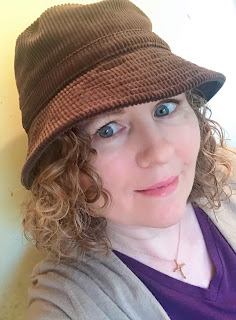Character Development: The Protagonist
By Lynn McPherson
January is a great time for new beginnings, in life and in
writing. Today I’m going to focus on the importance of writing a good
protagonist in a mystery series. It is an essential part of a story and one
that should be considered carefully.
writing. Today I’m going to focus on the importance of writing a good
protagonist in a mystery series. It is an essential part of a story and one
that should be considered carefully.
There are a number of characteristics that must be decided
about a central figure in a book. As a mystery writer, I always consider the
sleuth first. Who am I going to be working with on a daily basis? Big question.
about a central figure in a book. As a mystery writer, I always consider the
sleuth first. Who am I going to be working with on a daily basis? Big question.
First of all, a writer must decide if their character is
going to be a professional detective. If the crime solver is a police officer,
they must follow official protocol. There are specific methods used by the
detective, subject to the laws of the particular location where the story is
based. It would belong to the sub-genre known as a police procedural. A great
example is Louise Penny’s Chief Inspector Armand Gamache Series. If you are
interested in writing one, read these. They are fabulous.
going to be a professional detective. If the crime solver is a police officer,
they must follow official protocol. There are specific methods used by the
detective, subject to the laws of the particular location where the story is
based. It would belong to the sub-genre known as a police procedural. A great
example is Louise Penny’s Chief Inspector Armand Gamache Series. If you are
interested in writing one, read these. They are fabulous.
If the detective is not a professional, the books fit into
the Amateur Sleuth category. Do you want to create an insightful character who
stumbles onto mysteries? Like Jessica Fletcher from Murder, She Wrote, or Joanna Fluke’s Hannah Swensen Series? These are typically light-hearted whodunnits
that incorporate fun into murder. The trick is to be mindful of how and why the sleuth is able to
solve the mystery as opposed to the police. Amateur Sleuth books are my favourite. Mine fit into this category. My amateur sleuth, Izzy Walsh, is a busy 1950’s homemaker who has great intuition and a knack for trouble.
the Amateur Sleuth category. Do you want to create an insightful character who
stumbles onto mysteries? Like Jessica Fletcher from Murder, She Wrote, or Joanna Fluke’s Hannah Swensen Series? These are typically light-hearted whodunnits
that incorporate fun into murder. The trick is to be mindful of how and why the sleuth is able to
solve the mystery as opposed to the police. Amateur Sleuth books are my favourite. Mine fit into this category. My amateur sleuth, Izzy Walsh, is a busy 1950’s homemaker who has great intuition and a knack for trouble.
Other considerations to consider are strengths and
weaknesses. No one is perfect so it is important to create a likeable yet
flawed character. Are they observant but clumsy? Perceptive yet disorganized?
You must decide how to give your character a leg up on others around them so they are successful in their quest to solve the crime. But make sure they are worth rooting for. If the main character is rude or arrogant, it’s a tough sell and makes it difficult to pull the reader into the story. Make
sure you create someone who fans can cheer on and invest in.
weaknesses. No one is perfect so it is important to create a likeable yet
flawed character. Are they observant but clumsy? Perceptive yet disorganized?
You must decide how to give your character a leg up on others around them so they are successful in their quest to solve the crime. But make sure they are worth rooting for. If the main character is rude or arrogant, it’s a tough sell and makes it difficult to pull the reader into the story. Make
sure you create someone who fans can cheer on and invest in.
Finally, you need to make sure there is a reason for the
protagonist to be in the story. What is their motivation? If you are writing a
police procedural, this is less of a concern, other than to have an
understanding of what compelled them to become a police officer in the first place. For
the Amateur Sleuth, we need to know why they are there. Has their friend been
wrongly accused? Do they have a personal connection to the crime? Or, do they have a natural curiosity that drives their determination?
protagonist to be in the story. What is their motivation? If you are writing a
police procedural, this is less of a concern, other than to have an
understanding of what compelled them to become a police officer in the first place. For
the Amateur Sleuth, we need to know why they are there. Has their friend been
wrongly accused? Do they have a personal connection to the crime? Or, do they have a natural curiosity that drives their determination?
There are so many choices and decisions to consider when
creating your protagonist. These are just a few suggestions of where to start.
creating your protagonist. These are just a few suggestions of where to start.
Good luck and, most importantly, have fun with it!
Lynn McPherson has worked for the Royal Canadian Mounted Police, ran a small business, and taught English across the globe. She has travelled the world solo where her daring spirit has led her to jump out of airplanes, dive with sharks, and learn she would never master a surfboard. She now channels her lifelong love of adventure and history into her writing, where she is free to go anywhere, anytime. Her cozy series has three books out: The Girls’ Weekend Murder and The Girls Whispered Murder, and The Girls Dressed For Murder.






Great, thoughtful stuff yipper. Onward.
Thank you so much!